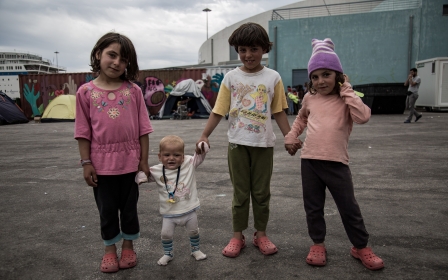EU failing to stop people smugglers in Mediterranean: UK report

The EU naval mission launched to tackle people smugglers in the Mediterranean is failing to deliver and has put some migrants and refugees at greater risk, a British parliamentary committee has warned.
In a report published on Friday, the House of Lords EU Committee says Operation Sophia, named for a baby born on a ship off the Libyan coast, is having an "insignificant" impact curbing the smuggling industry and has only resulted in low-level arrests.
Launched in September 2015 with the aim of fighting smugglers and rescuing refugees at sea, the mission has saved 9,000 migrants and refugees, the report noted.
But the mission is struggling, according to the report, as a result of the lack of stability in Libya, the adaptation of smugglers to avoid detection and the failure of authorities to understand smuggling networks.
The operation's destruction of wooden boots has encouraged smugglers to use rubber dinghies, which has put travellers at great risk, the report said.
It said that while the operation was limited to the high seas and was unable to operate in Libyan waters or onshore, "significant gaps" would remain in its understanding of the smuggling networks.
"Our report stresses that the operation is succeeding in carrying out its separate search and rescue obligations, which is to be commended. This is a humanitarian obligation that should be maintained," said Christopher Tugendhat, the chairman of the committee.
"However, a naval mission cannot disrupt the business model of people smuggling, and in this sense it is failing. The smuggling networks operate from Libya, and they extend through Africa. Without support from a stable Libyan government, the operation is unable to gather the intelligence it needs or tackle the smugglers onshore."
A spokesperson for the European Commission told Middle East Eye that the report was an "informative contribution to the public debate" surrounding efforts to disrupt people trafficking in the Mediterranean.
The spokesperson put the number of lives saved by the mission at more than 13,700 people and said that in seven months the operation had apprehended 69 suspected smugglers and neutralised more than 100 vessels.
"This is a substantial achievement in such short period of time. The operation served as a disincentive for traffickers," the spokesperson said.
"They no longer can operate in impunity in high seas. We are now looking at ways for the operation to be even more effective, building on these achievements."
The EU would continue to engage with Libyan authorities with a view to operating in territorial waters and was also working on the possible extension of the operation for a year with additional tasks such as training the Libyan coastguard, the spokesperson added.
Arrivals in Greece down by 90 percent
Meanwhile, the number of migrants and refugees arriving in Greece dropped by nearly 90 percent in April, the International Organisation for Migration said on Friday.
Last month, 3,360 migrants and refugees landed on the Greek islands, compared with 26,971 in March, according to IOM data.
The remarkable shift in migration follows a deal reached in March under which Turkey has agreed to take back Syrian migrants landing on Greek islands in exchange for political incentives, including billions of euros in aid and visa-free European travel for its citizens.
The EU border agency Frontex also reported on the slowdown Friday saying it had registered 2,700 arrivals in Greece last month and describing the development as "dramatic".
"The total for all of April is well below the number of people we often saw reaching just the island of Lesbos on a daily basis during last year's peak months," Frontex chief Fabrice Leggeri said in a statement.
Greece has since last June seen far more arrivals than Italy, driven mainly by refugees fleeing conflicts in war-ravaged Syria, Iraq and Afghanistan, but the balance has shifted since 1 April, the UN refugee agency said.
"For the first time last month there were more arrivals in Italy than in Greece," UNHCR spokesman William Spindler told reporters on Friday.
The UN refugee agency said that so far this year 187,920 refugees and migrants had arrived in Europe by sea, including 155,765 to Greece and 31,252 to Italy.
But in April, Italy saw 9,149 arrivals - nearly three times more than Greece, according to IOM.
There has been speculation that the EU-Turkey deal and the virtual closure of the route to Greece would push refugees from Syria to begin travelling through North Africa and onto Italy instead.
This seemed to be confirmed by Thursday, when the Italian coastguard and UNHCR said some 150 Syrians were among hundreds of migrants rescued off the coast of Sicily, but IOM spokesman Joel Millman said Friday that number appeared to have been greatly exaggerated.
When the boat that had left Egypt and was believed to be carrying the Syrians "came in just a few hours ago there were only two individuals who claimed to be Syrian," Millman told reporters.
Spindler meanwhile stressed that people were still being disembarked from a number of boats that rescued up to 1,000 people who had set off from Egypt and Libya.
"We still don't have all the details about the composition of the people who were rescued," he said, adding though that "we cannot yet say that there is a shift in the routes from Turkey to Greece, into North Africa to Italy. It's too early to say."
Stay informed with MEE's newsletters
Sign up to get the latest alerts, insights and analysis, starting with Turkey Unpacked
Middle East Eye delivers independent and unrivalled coverage and analysis of the Middle East, North Africa and beyond. To learn more about republishing this content and the associated fees, please fill out this form. More about MEE can be found here.




